SML1845
Thapsigargin Ready Made Solution
≥98% (HPLC), 10 mM in DMSO
Sinónimos:
CHEBI:9516, CHEMBL96926, MFCD00083511, UNII-Z96BQ26RZD, Z96BQ26RZD, [(3S,3aR,4S,6S,6aR,7S,8S,9bS)-6-acetyloxy-4-butanoyloxy-3,3a-dihydroxy-3,6,9-trimethyl-8-[(Z)-2-methylbut-2-enoyl]oxy-2-oxo-4,5,6a,7,8,9b-hexahydroazuleno[4,5-b]furan-7-yl] octanoate
About This Item
Productos recomendados
biological source
(Thapsia garganica L seeds)
Quality Level
assay
≥98% (HPLC)
form
DMSO solution
concentration
10 mM in DMSO
shipped in
dry ice
storage temp.
−20°C
InChI
1S/C34H50O12/c1-9-12-13-14-15-17-24(37)43-28-26-25(20(5)27(28)44-30(38)19(4)11-3)29-34(41,33(8,40)31(39)45-29)22(42-23(36)16-10-2)18-32(26,7)46-21(6)35/h11,22,26-29,40-41H,9-10,12-18H2,1-8H3/b19-11-/t22-,26+,27-,28-,29-,32-,33+,34+/m0/s1
InChI key
IXFPJGBNCFXKPI-FSIHEZPISA-N
Application
Biochem/physiol Actions
Other Notes
Storage Class
10 - Combustible liquids
wgk_germany
WGK 2
flash_point_f
188.6 °F - closed cup
flash_point_c
87 °C - closed cup
Certificados de análisis (COA)
Busque Certificados de análisis (COA) introduciendo el número de lote del producto. Los números de lote se encuentran en la etiqueta del producto después de las palabras «Lot» o «Batch»
¿Ya tiene este producto?
Encuentre la documentación para los productos que ha comprado recientemente en la Biblioteca de documentos.
Los clientes también vieron
Nuestro equipo de científicos tiene experiencia en todas las áreas de investigación: Ciencias de la vida, Ciencia de los materiales, Síntesis química, Cromatografía, Analítica y muchas otras.
Póngase en contacto con el Servicio técnico







